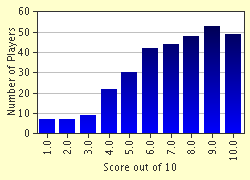Quiz Answer Key and Fun Facts
1. Name an adverb clause in the following sentence: When he spilled the tray of cookies, Jake got on his knees, moved the cookies back onto the tray, and placed the tray in the refrigerator as if nothing had happened.
2. Name the independent clause in the following sentence: As the cat slinked across the backyard, she smiled at the dog, who barked with fervor.
3. Name the structure of the following sentence: Lucille donated hundreds of books to the school, and Marty gave hundreds of hours in volunteer work for the community center.
4. Name the adjective phrase in the following sentence: David hummed in ecstasy when he thought about the girl with blond hair who kissed him last night.
5. Name the noun clause in the following sentence: Claudia pretended to understand what Mike said.
6. Name the infinitive phrase in the following sentence: Carla wanted to beat her opponent in tennis.
7. Name the participial phrase in the following sentence: Trembling with fear, Robert moved along the ledge of the building.
8. Name the structure of the following sentence: Sheri, who is an excellent cook, fixed the food for the banquet.
9. Name the appositive phrase in the following sentence: Louisville, otherwise known as "The Derby City", hosts the Kentucky Derby every first Saturday in May.
10. Which of the following could not be considered an independent clause?
Source: Author
mazeface
This quiz was reviewed by FunTrivia editor
agony before going online.
Any errors found in FunTrivia content are routinely corrected through our feedback system.


